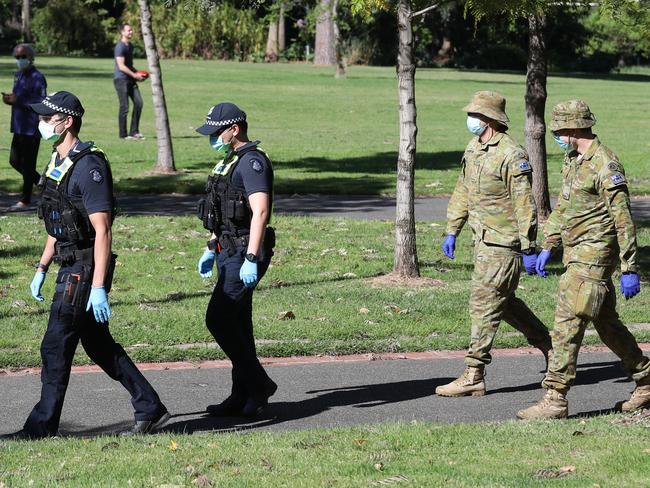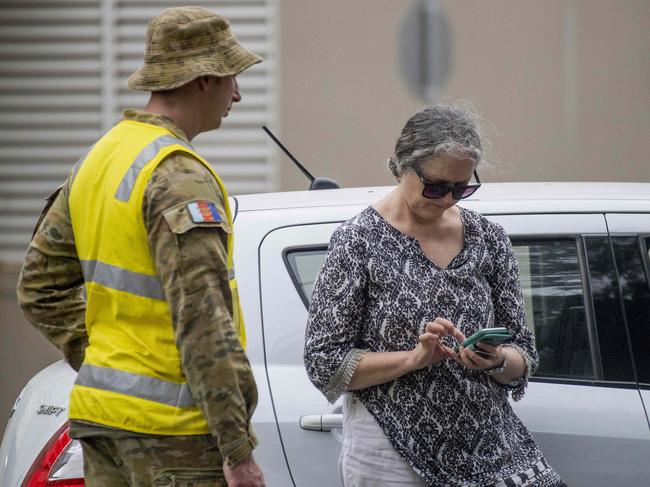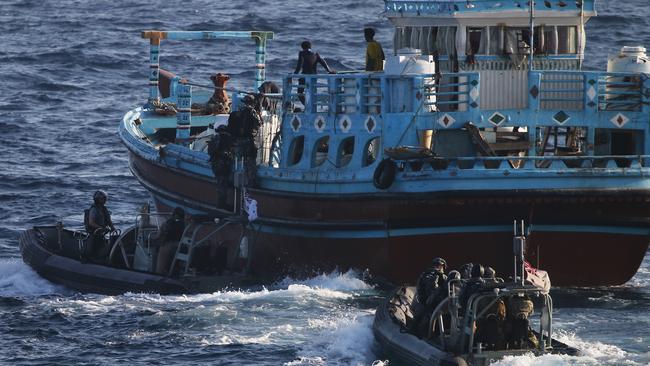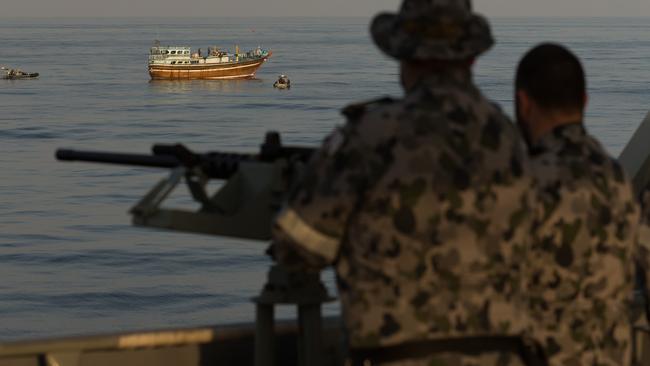Al-Qaeda’s ‘second in command’ killed by Afghan forces; Australian forces pull out of Middle East after 30 years to focus on Asia
Afghan security forces have killed Abu Muhsin al-Masri, a senior al-Qaeda leader who was on the FBI’s Most Wanted Terrorists list. It comes as Australia’s 30-year commitment to the Middle East comes to an end.
World
Don't miss out on the headlines from World. Followed categories will be added to My News.
Afghan forces have killed a top al-Qaeda militant wanted by the United States, as the government accused the Taliban of still keeping close ties with the Islamist militant group.
Abu Muhsin al-Masri, an Egyptian national believed to be the group’s number two in the Indian sub-continent, was targeted in eastern Ghazni province, Afghanistan’s intelligence agency said in a statement.
The National Directorate of Security did not provide further details about the operation or when it was carried out.
Masri’s killing was an indication of the relationship between the Taliban and al-Qaeda, Afghanistan’s Interior Minister Masoud Andarabi claimed on Sunday without providing details.
“The killing of one of the key al-Qaeda member, al-Masri by the National Directorate of Security demonstrates close ties of the Taliban with the terrorist groups that are operating against the Afghan government and its people,” he tweeted.
“They still keep close relations with the terrorist groups and they are lying to different sides.” The Taliban’s sheltering of al-Qaeda was the original reason for the US invasion of Afghanistan after the September 11, 2001 attacks.

In a landmark deal with the United States in February, the Taliban agreed to not allow Afghan soil to be used by foreign extremists including al-Qaeda, in return for Washington withdrawing its troops from the country.
Masri, who also goes by the name Husam Abd-al-Ra’uf, is on the FBI’s Most Wanted Terrorists list.
A US warrant for his arrest was issued in December 2018 after he was charged with providing support and resources to a foreign terrorist organisation and plotting to kill US nationals, according to the FBI.
A source at the Afghan intelligence agency, who did not want to be named, told AFP that an aide to Masri who was “in contact with the Taliban” was also detained during the operation in Ghazni province, a volatile region where Taliban fighters are very active.
Pakistan-based analyst Rahimullah Yousufzai, who previously interviewed al-Qaeda founder Osama bin Laden, said Masri was largely unknown but his killing showed that these militants still existed.
“This incident shows that al-Qaeda’s men are few and far between, but they are still there,” he told AFP.
Masri was from the second tier of al-Qaeda which kept him largely unknown, according to a source with a jihadi group based at an unknown location in Pakistan.
AUSTRALIA PULLS OUT OF MIDDLE EAST AFTER 30 YEARS
Australia will militarily pull out of the Middle East to ring proof Australia with the last naval element of the ADF’s commitment to the region now being withdrawn.
In line with the 2020 Strategic Defence Review from July, the Australian Defence Force will focus resources, training and deployments in the Indo-Pacific region and effectively end 30 years of sending troops and assets to the Middle East.
The move follows the US drawdown from that region announced late last year as well as ADF’s own assessment recently on its stretched resources domestically, notably exacerbated since forced commitments to combat floods, bushfires and the COVID-19 crisis.
It found the Royal Australian Navy’s ranks had not grown in numbers to the point it could now not put enough ships out to sea; HMAS Perth frigate has not been out to sea after dry dock maintenance and upgrade due to a lack of crew.


Just last month the ADF had to increase its commitment to the coronavirus hotel quarantine compliance effort after Prime Minister Scott Morrison announced an increase in the cap of incoming air passengers; that cap increased again yesterday is expected to increase again before the end of the year.
There are already almost 3000 ADF members on COVID-19 duties.
There has been disquiet in the ADF ranks for some time about the forces’ being stretched not only due to unforeseen crisis but with new military assets on land, sea and air coming into service over coming years.
It also wanted to conduct more engagement with the Pacific nations and elsewhere, worried by China’s growing military influence in the region.
“We now face an increasingly challenging strategic environment which is placing greater demand on ADF resources closer to home,” Defence Minister Linda Reynolds said.
“As a result, the Australian Defence Force will reduce its naval presence in the Middle East to enable more resources to be deployed in our region.”

MORE NEWS:
The ADF’s war on drug sin the Pacific
How climate change is ADF’s most threatening enemy
New home force against pandemics, bushfires, enemies
The changes include ceasing the annual deployment of a RAN ship to the Middle East and not extending Australia’s time-bound commitment to the International Maritime Security Construct (IMSC) beyond December 2020.
The latter has seen Australia commit to a warship in the Gulf to assure freedom of passage for merchant vessels about the Strait of Hormuz after aggressive posturing from Iran.
The RAAF had also committed a P-8A Poseidon surveillance spy aircraft to the operation which has since been withdrawn.
Other air assets and their support crews had also quietly been withdrawn in recent months and relocated back in Australia as have troops from both Afghanistan and Iraq.
Senator Reynolds said ADF had done its time and served global security in the region well.
“For over 30 years we have supported freedom of navigation, maritime security and the free flow of commerce in the Middle East,” Ms Reynolds said.

“In co-operation with our partners, our commitments have been invaluable in disrupting global drugs trade, supporting the reduction of funding lines to terrorism activity and building the capacity of regional forces.”
Chief of Joint Operations Lieutenant General Greg Bilton said these were historic changes for the ADF.
“The outstanding contribution of Royal Australian Navy ships has been highly valued by our partners in the Middle East. We should all be proud of what the Royal Australian Navy has achieved over such a long period of sustained operations.”
The Australian Defence Force will maintain staff positions with the Combined Maritime Forces, the United States Naval Forces Central Command, and within Joint Task Force 633.
HMAS Toowoomba was the last Australian ship to deploy to the Middle East under Operation MANITOU and returned in June.
Originally published as Al-Qaeda’s ‘second in command’ killed by Afghan forces; Australian forces pull out of Middle East after 30 years to focus on Asia
